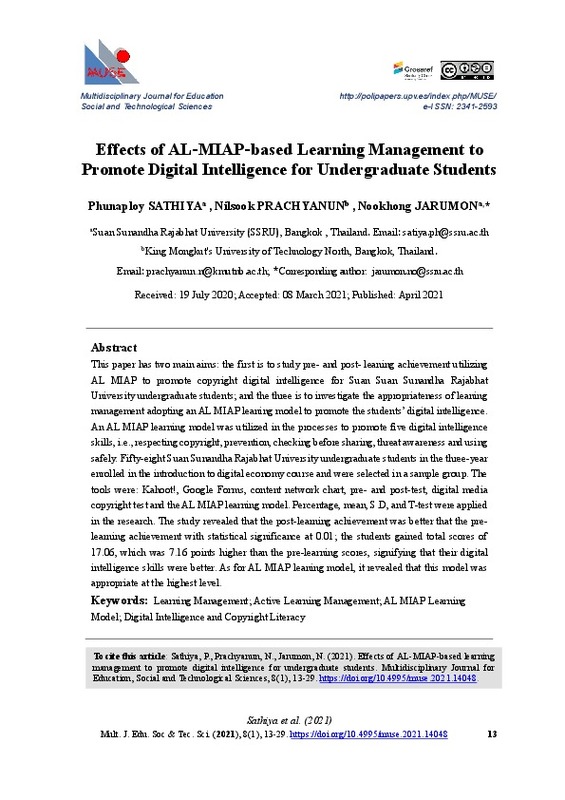Alanazi, H. M. N. (2020). The Effects of Active Recreational Math Games on Math Anxiety and Performance in Primary School Children: An Experimental Study. Multidisciplinary Journal for Education, Social and Technological Sciences, 7(1), 89. https://doi.org/10.4995/muse.2020.12622
Aparicio, F., Morales-Botello, M. L., Rubio, M., Hernando, A., Muñoz, R., López-Fernández, H., … Buenaga, M. de. (2018). Perceptions of the use of intelligent information access systems in university level active learning activities among teachers of biomedical subjects. International Journal of Medical Informatics, 112(May 2017), 21-33. https://doi.org/10.1016/j.ijmedinf.2017.12.016
Berlinski, S., & Busso, M. (2017). Challenges in educational reform: An experiment on active learning in mathematics. Economics Letters, 156, 172-175. https://doi.org/10.1016/j.econlet.2017.05.007
[+]
Alanazi, H. M. N. (2020). The Effects of Active Recreational Math Games on Math Anxiety and Performance in Primary School Children: An Experimental Study. Multidisciplinary Journal for Education, Social and Technological Sciences, 7(1), 89. https://doi.org/10.4995/muse.2020.12622
Aparicio, F., Morales-Botello, M. L., Rubio, M., Hernando, A., Muñoz, R., López-Fernández, H., … Buenaga, M. de. (2018). Perceptions of the use of intelligent information access systems in university level active learning activities among teachers of biomedical subjects. International Journal of Medical Informatics, 112(May 2017), 21-33. https://doi.org/10.1016/j.ijmedinf.2017.12.016
Berlinski, S., & Busso, M. (2017). Challenges in educational reform: An experiment on active learning in mathematics. Economics Letters, 156, 172-175. https://doi.org/10.1016/j.econlet.2017.05.007
Brian Chen, C. C., Kathy Huang, C. C., Gribbins, M., & Swan, K. (2018). Gamify online courses with tools built into your learning management system (Lms) to enhance self-determined and active learning. Online Learning Journal, 22(3), 41-54. https://doi.org/10.24059/olj.v22i3.1466
Budoya, C. M., Kissake, M., & Mtebe, J. (2019). Instructional Design Enabled Agile Method Using ADDIE Model and Feature Driven Development Method. International Journal of Education and Development Using Information and Communication Technology, 15(1), 35.
Chuangprakhon, S., Santaveesuk, P., & Nilsook, P. (2018). A Model of Distance Learning for Music Art of Higher Education in Thailand. Technical Education Journal King Mongkut's Universily of Technology North Bangkok., 19(3), 39-46.
Costa, C. J., Aparicio, M., & Raposo, J. (2020). Determinants of the management learning performance in ERP context. Heliyon, 6(4), e03689. https://doi.org/10.1016/j.heliyon.2020.e03689
Dostál, J., Wang, X., Steingartner, W., & Nuangchalerm, P. (2017). Digital Intelligence - New Concept in Context of Future of School Education. ICERI2017 Proceedings, 1(November), 3706-3712. https://doi.org/10.21125/iceri.2017.0997
Duin, A. H., & Tham, J. (2020). The Current State of Analytics: Implications for Learning Management System (LMS) Use in Writing Pedagogy. Computers and Composition, 55, 102544. https://doi.org/10.1016/j.compcom.2020.102544
Elfeky, A. I. M., Masadeh, T. S. Y., & Elbyaly, M. Y. H. (2020). Advance organizers in flipped classroom via e-learning management system and the promotion of integrated science process skills. Thinking Skills and Creativity, 35(November 2019), 100622. https://doi.org/10.1016/j.tsc.2019.100622
Elia, G., Margherita, A., & Passiante, G. (2020). Digital entrepreneurship ecosystem: How digital technologies and collective intelligence are reshaping the entrepreneurial process. Technological Forecasting and Social Change, 150(September 2019), 119791. https://doi.org/10.1016/j.techfore.2019.119791
Feldman, R., Ewing, T., & Jeruss, S. (2013). UCLA Journal of Law & Technology. UCLA Journal of Law & Technology, 21(1), 1-82.
Frost, R. D., Matta, V., & MacIvor, E. (2015). Assessing the efficacy of incorporating game dynamics in a learning management system. Journal of Information Systems Education, 26(1), 59-70.
Ge, S. S., Guerra, T. M., Lewis, F. L., Principe, J. C., & Colnarič, M. (2014). Computational Intelligence in Control António E Ruano 1. IFAC Proceedings Volumes, 47(3), 8867-8878. https://doi.org/10.3182/20140824-6-za-1003.01164
Gómez-Ejerique, C., & López-Cantos, F. (2019). Application of innovative teaching-learning methodologies in the classroom. Coaching, flipped-classroom and gamification. A case study of success. Multidisciplinary Journal for Education, Social and Technological Sciences, 6(1), 46. https://doi.org/10.4995/muse.2019.9959
Kaeophanuek, S., Na-songkhla, J., & Nilsook, P. (2019). A Learning Process Model to Enhance Digital Literacy using Critical Inquiry through Digital Storytelling. IJET International Journal Emerging Technologies in Learning, 14(3), 22-37. https://doi.org/10.3991/ijet.v14i03.8326
Khotmanee, W., Kaeotasaeng, W., & Akatimagool, S. (n.d.). Asia - Pacific Journal of Science and Technology model ; a case study of basic antenna design. 1-8.
Leela, S, Chookkaew, S. & Nilsuk, P. (2019). Development of a model for managing micro-learning with live books that promote computational thinkin. National Academic Conference. Academic Information Science, 8.
Lerdrungporn, P., Wattananarong, K., & Wiriyanon, T. (2017). The Development of Learning Management System for Tablets. Technical Education Journal King Mongkut's Universily of Technology North Bangkok., 3(1), 78-86.
Llantos, O. E., & Estuar, M. R. J. E. (2019). Characterizing instructional leader interactions in a social learning management system using social network analysis. Procedia Computer Science, 160(2018), 149-156. https://doi.org/10.1016/j.procs.2019.09.455
Media., O. of H. P. F. A. the C. and Y. M. P. F. I. of J. (2018). Digital intelligence. Retrieved from http://cclickthailand.com/contents/general/dq3.pdf
Moreira, F., Ferreira, M. J., & Seruca, I. (2018). Enterprise 4.0 - The emerging digital transformed enterprise? Procedia Computer Science, 138, 525-532. https://doi.org/10.1016/j.procs.2018.10.072
National Council for Higher Education, Science, R. and I. P. C. A. the O. of the S. P. B. R. and innovation. (2019). Policy and strategy for higher education, science, research and innovation 2020 - 2027 and science plans Research and Innovation. Retrieved from A Learning Process Model to Enhance Digital Literacy using Critical Inquiry through Digital Storytelling
Perry, M. (2016). Global governance of intellectual property in the 21st century: Reflecting policy through change. In Global Governance of Intellectual Property in the 21st Century: Reflecting Policy Through Change. https://doi.org/10.1007/978-3-319-31177-7
Phutthikun, S. (2015). Quality of Students Derived From Active Learning Process. Journal of Educational Services. Burapha University, 6(2), 1-13.
Samuelson, P. (2017). Strategies for discerning the boundaries of copyright & patent protections. Notre Dame Law Review, 92(4), 1493-1538.
Stiakakis, E., Liapis, Y., & Vlachopoulou, M. (2019). Developing an Understanding of Digital Intelligence As a Prerequisite of Digital Competence. The 13th Mediterranean Conference on Information Systems (MCIS), 1-14.
Thanachawengsakul, N., & Jeerungsuwan, N. (2019). INSTRUCTIONAL MODEL OF MIAP ON CLOUD COMPUTING TECHNOLOGY OF THE UNDERGRADUATE STUDENTS IN ORDER TO PROMOTE 21st CENTURY LEARNING SKILLS. Journal of Education Naresuan University, 20(4), 58-69.
Toda, A. M., Valle, P. H. D., & Isotani, S. 1007_97.-3-319-97934-2_9. bibij. (2018). Higher Education for All. From Challenges to Novel Technology-Enhanced Solutions. HEFA 2017: Higher Education for All. From Challenges to Novel Technology-Enhanced Solutions, Communicat(August), 143-156. https://doi.org/10.1007/978-3-319-97934-2
[-]








